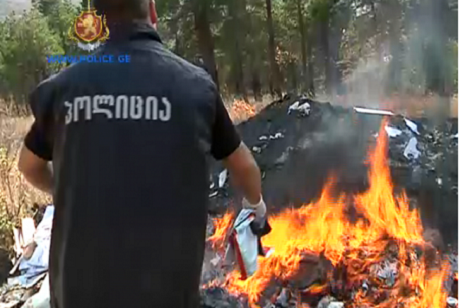Georgian Government enforcing tough anti-drug rules, US report says

A tough stance on drug use and illegal trafficking in Georgia saw the country’s authorities seize significant amounts of drugs last year although domestic drug abuse continues to be a problem in Georgia, a US drug report has revealed.
The increasingly high priority placed on narcotics interdiction by the current Georgian Government meant the amount of drugs seized in Georgia "increased dramatically” in 2013, said the US Department of State in its 2014 International Narcotics Control Strategy Report (INCSR).
"In July, Georgian police seized 116 kilograms of heroin from a truck that had crossed the border from Armenia — the largest drug seizure in Georgia since independence from the Soviet Union,” the report said.
The report said Georgia was a transit and destination country for illicit drugs produced abroad.
"The most significant route runs from Afghanistan and Iran through Azerbaijan and Georgia, to destinations in Western Europe, Turkey, and Russia.”
The report also stated the Russian-occupied territories of Georgia, South Ossetia and Abkhazia, remained beyond the control of Georgian law enforcement.
It recommended non-Governmental organisations, addiction experts, faith-based groups, and other stakeholders to continue working to provide more effective treatment methods and advocacy to reduce drug demand.
Despite the Government’s positive moves to curb drugs from entering Georgia, the country also had a domestic drug problem.
Experts estimated about 45 000 locals (1 percent of the total population) used drugs intravenously.
According to report, amphetamine-type stimulants (ATS) known as "Jeff” and "Vint” and a locally-produced desomorphine opioid known as "krokodil” were gaining in popularity.
"Among other drugs, heroin, buprenorphine, methadone and marijuana are available on the domestic market. There is domestic production and use of methamphetamine and pseudoephedrine derivatives and abuse of pharmaceutical drugs, especially in urban areas,” the study found.
The report said some amendments had been made to the National Law on Narcotics in 2012 to meet certain international standards but current legislation still did not meet the 1988 UN Drug Convention’s requirements, particularly in the listing of drugs designated as illegal under Georgian law.
The INCSR also highlighted the Georgian Government was currently finalizing the National Strategy and Action Plan for Cabinet and Prime Minister to review and approve later this year.
The report also threatened there was an acute lack of drug prevention measures, even though treatment and social rehabilitation programs had become more active in Georgia.
The United States encouraged Georgia to continue mounting a strong law enforcement response to drug trafficking and domestically-produced stimulants and opioids.
At the end of the report, the US promised they would continue to provide training and technical support on narcotics control issues and encourage inter-agency and Government-to-civil society cooperation.
 Tweet
Tweet  Share
Share